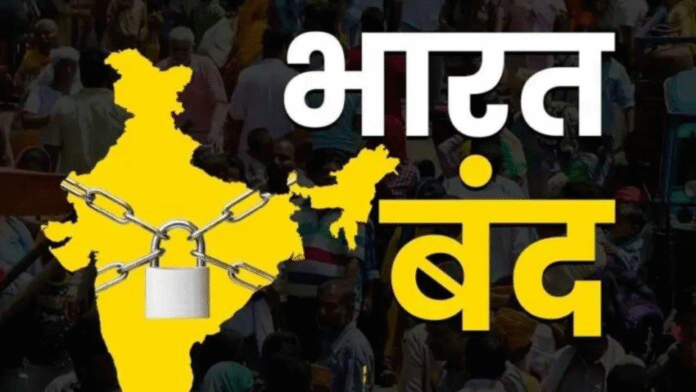Introduction: What to Expect on July 9 on Bharat Band
On July 9, India will experience a significant national shutdown—referred to as Bharat Bandh—prompted by a coalition of trade unions and farmers’ groups. With an estimated 250 million participants, services across sectors like transportation, banking, and insurance may be heavily disrupted. In this post, we’ll examine the motivations behind the bandh, its repercussions, and what you should consider staying informed.
What Exactly Is the Campaign About?
A Bharat Bandh aims to bring the country to a halt in order to protest government decisions. This time, ten central trade unions including INTUC, AITUC, CITU, and SEWA, along with farmer organizations, have come together. The primary grievance centers on the government’s “pro-corporate, anti-worker and anti-farmer” direction. If fully executed, this would mark India’s 22nd all-India strike since 1991.
Amarjeet Kaur, General Secretary of AITUC, states:
“This Bharat Bandh is a collective outcry against policies that prioritize corporate interests… a call for justice and fair labor practices.”
Why Are Protesters on the Streets?
The strike is driven by a 17-point demand list, with a major focus on repealing the 2020 labor codes which cover wages, industrial relations, social security, and worker safety. Additional demands include:
- Restoring the Old Pension Scheme for better financial security
- Setting a ₹26,000 Minimum Wage to support basic living expenses
- Stopping PSU Privatization to protect public employment levels
- Limiting Contractual Employment, with calls for regular, secure jobs
Farmers are also voicing concerns over policies favoring big agribusinesses. In Bihar, this bandh overlaps with protests against the revised voter list before local elections.
Harbhajan Singh Sidhu of Hind Mazdoor Sabha adds:
“These labor codes have stripped workers of hard-earned rights… reclaiming dignity for the working class.”
Also Read: Why Earth Day 2025 is More Important Than Ever
Impact on Key Sectors
Here’s a sector-wise breakdown of anticipated disruptions:
- Public Transport
Buses, autos, and even some rail services could be grounded in states including Kerala, West Bengal, and Odisha. - Banking and Finance
Though RBI hasn’t declared a holiday, many banks may operate with skeletal staff—causing delays in transactions and services. NSE and BSE will, however, open as usual. - Postal and Insurance
Mail delivery and insurance processing may slow due to staff union participation. - Coal and Industry
Factory output and mining operations may be scaled down due to reduced workforce presence. - Electricity Supply
With around 2.7 million power sector workers striking, localized disruptions—though not nationwide outages—are possible.
Uninterrupted services: Hospitals, emergency services, fire departments, police, pharmacies, and schools (unless stated otherwise at the local level).
Regional Variations in Disruption
- Kerala: Reports suggest near-total closure of transport services
- West Bengal: Some protests escalated, leading to confrontations in Howrah and Kolkata
- Odisha: Highway blockades reported near Bhubaneswar
- Tamil Nadu: Road obstructions near key junctions like Madurai
- Bihar: Paired with a separate bandh triggered by voter list issues
- Mumbai: Anticipate delays in banking, power, and postal services, while trains and private offices proceed mostly as usual
FAQs on July 9 Bharat Bandh
Q: Why are unions protesting?
They oppose the recent labor codes and push for better wages, job security, pension rights, and protections against PSU privatization.
Q: Will banks and ATMs be open?
Officially yes, but you may find limited services—so it’s wise to plan ahead or bank online.
Q: Will schools and colleges close?
There are no official closures announced. In Karnataka, educational institutions have confirmed they’ll stay open.
Q: Will emergency services be affected?
No, emergency services will remain fully operational to ensure public safety.
Q: What about public transport?
Prepare for major disruptions in buses and trains, especially in regions like Kerala and West Bengal—plan alternative travel options.
How to Navigate the Day
- Plan travel wisely: Avoid public transport in affected zones; use personal vehicles or rideshares
- Handle banking in advance: Complete key transactions before the 9th or switch to online methods
- Stay informed: Follow media outlets like Hindustan Times, The Hindu, and Live Mint for real-time updates
- Consider remote work: If commuting looks risky, coordinate with your employer to work from home
- Boost your skills: Enroll in a digital marketing course like those available in Mumbai to build communication resilience during disruptive events
Political and Social Context
The Bharat Bandh has backing from opposition parties such as the Congress, with leaders like Rahul Gandhi supporting the Bihar bandh. Congress MP Randeep Singh Surjewala highlighted that over 53 percent of India’s workforce lacks social security coverage. However, not all unions participate—BMS and 213 other unions are staying out, showing a split in the labor movement.
On-ground scenes remain largely peaceful, though minor clashes have occurred such as in Naxalbari and Howrah.
Conclusion
July 9’s Bharat Bandh is a significant protest by millions of workers and farmers demanding fair policies. While daily life will be disrupted, this movement highlights core issues like workers’ rights, fair wages, pension security, and the role of public enterprises.
Stay safe, stay informed—and consider using this moment to strengthen your digital communication skills through focused courses like digital marketing programs in Mumbai. Let us know how the Bharat Bandh is affecting your region in the comments below.




